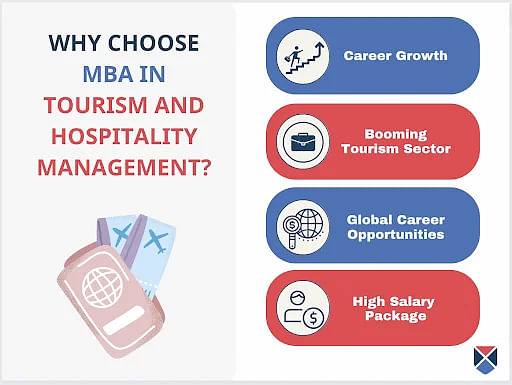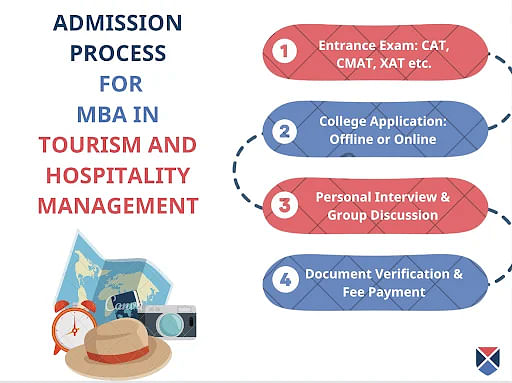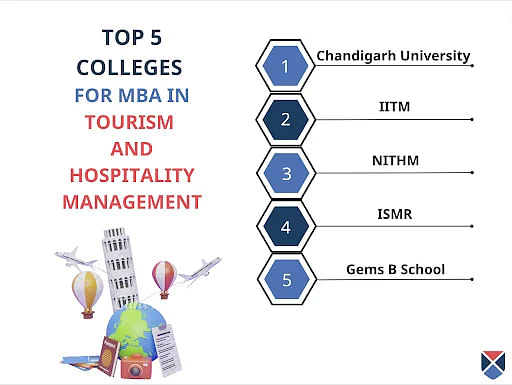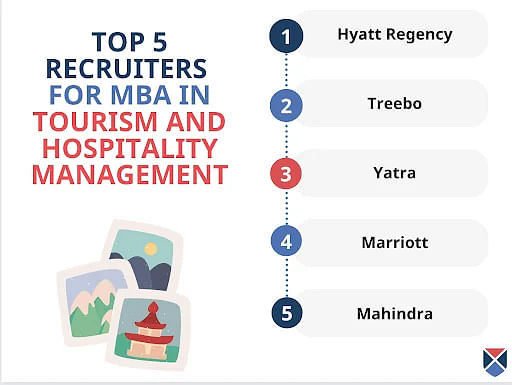MBA in Tourism and Hospitality Management: Course Details, Eligibility, Admission, Fees

MBA in Tourism and Hospitality Management is designed to provide an extensive understanding of both business management principles and the intricacies of the hospitality sector. Students typically engage with topics such as Tourism Marketing, Hotel and Restaurant Management, Event Planning, Sustainable Tourism, Financial Management, and Cultural Tourism. This multifaceted curriculum prepares graduates to excel in various roles within hotels, resorts, travel agencies, event management companies, and government tourism departments.
MBA in Tourism and Hospitality Management admission procedure necessitates a bachelor's degree from a recognized university, with a minimum score of 50%, offering 5% relaxation for candidates from reserved categories. Common management entrance exams like CAT or MAT are generally accepted, and eligibility criteria often consider competitive exam scores and academic performance. The program's average fees vary widely based on the institution and location, ranging from approximately INR 30,000 to INR 3 LPA.
Table of Contents
- What is an MBA in Tourism and Hospitality Management?
- MBA in Tourism and Hospitality Management Eligibility Criteria
- Why Pursue an MBA in Tourism and Hospitality Management Course?
- MBA in Tourism and Hospitality Management Admission 2023
- MBA in Tourism and Hospitality Management Entrance Exam
- Top MBA in Tourism and Hospitality Management Colleges with Fee Details
- Types of MBA in Tourism and Hospitality Management Courses
- MBA Tourism and Hospitality Management Syllabus and Subjects
- MBA in Tourism and Hospitality Management vs. MBA in Travel and Tourism Management
- Courses After MBA in Tourism and Hospitality Management
- MBA in Tourism and Hospitality Management Salary in India
- Careers After Completing an MBA in Tourism and Hospitality Management
- Skills to Be the Best MBA in Tourism and Hospitality Management Graduate
MBA in Tourism and Hospitality Management Course Details
| Degree | Masters |
| Full Form | Master of Business Administration in Tourism and Hospitality Management |
| Duration | 2 Years |
| Age | No age limit |
| Entrance Exam | CAT, MAT, XAT, ATMA |
| Minimum Percentage | 50% marks in Bachelor’s Degree from a recognized university. [Relaxations for the Reserved Category] |
| Average Fees | INR 30,000-3,00,000 Per Year |
| Similar Options of Study | MBA, MBA in Hospitality, MBA in Travel and Tourism, MBA in Tourism |
| Average Salary | INR 3 - 6 LPA |
| Employment Roles | Hotel Manager, Event Planner, Sustainable Tourism Advocate, Resort Operations Manager, Revenue Manager, Hospitality Technology Specialist, Revenue Analyst |
| Top Recruiters | Novotel, Hyatt, IndiaHikes, Tripver, Air India, Cognizant Technology Solutions, Taj. |
What is an MBA in Tourism and Hospitality Management?
MBA in Tourism and Hospitality Management program equips students with a specialized skill set tailored to the industry's dynamic demands. Students gain expertise that positions them for roles such as Hotel Manager, Event Coordinator, and Marketing Manager. Graduates can anticipate competitive salaries, with entry-level positions offering around INR 3 LPA - INR 6 LPA, and mid-level roles commanding salaries upwards of INR 6 LPA - INR 9 LPA.
MBA in Tourism and Hospitality Management falls under the umbrella of MBA courses. It not only opens doors to impactful roles but also provides a direct pathway to lucrative career growth within the thriving hospitality and tourism sector. Whether orchestrating memorable guest experiences or optimizing operational efficiency, graduates emerge equipped to excel and contribute meaningfully to an industry that values innovation and customer-centric strategies
MBA in Tourism and Hospitality Management Eligibility Criteria
Ensuring you meet the eligibility criteria is a fundamental step toward pursuing an MBA in Tourism and Hospitality Management. While the framework outlined below offers a general perspective, it's important to acknowledge that specific prerequisites may vary from one university to another. Here's an outline of the typical eligibility benchmarks:
- A bachelor's degree from a recognized university.
- A minimum aggregate score of 50% in the bachelor's degree, with relaxations of 5% for candidates from reserved categories.
- Provisional applications may be accepted from final-year students who anticipate meeting the minimum eligibility criteria upon completion.
- Entrance exams, such as CAT, MAT, CMAT, NMAT, and ATMA, are often mandatory, though specific exam preferences may differ among universities.
Why Pursue an MBA in Tourism and Hospitality Management Course?
Pursuing an MBA in Tourism and Hospitality Management prepares dynamic experts to navigate trends, innovate, and create outstanding guest experiences in hotel operations, marketing, or sustainable tourism. Here's why you should consider this course:
- Assured Career Placement: The program boasts an impressive track record of high CTC packages and 90% placement rates in institutions like the IITM and NITHM from top recruiters like Hyatt, Marriott, TripString, India Hikes, Taj, etc., with the highest recorded package of INR 25 LPA, setting a benchmark that surpasses the national average wage rate of INR 3.8 LPA.
- Accelerated Career Growth: Statistics reveal that professionals with an MBA in this field experience a remarkable 30% higher likelihood of accelerated career advancement compared to those without advanced qualifications.
- Thriving Industry: The tourism and hospitality sector boasts an annual growth rate surpassing 10%, offering a vibrant and promising landscape for diverse career opportunities.
- Relevant Curriculum: Focusing on essential subjects like Tourism Marketing, Hotel Operations, Financial Management, and Sustainable Practices, the curriculum equips students with skills that align directly with industry demands.

MBA in Tourism and Hospitality Management Admission 2023
MBA Tourism and Hospitality Management admission involves a structured procedure. While specific requirements may vary across institutions, the following is a general outline of the steps involved:
- Step 1: Eligible candidates need to submit their applications through online or offline modes. Online applications involve submitting details through the institution's designated portal. For offline applications, candidates can obtain and submit physical forms at the institution's admissions office.
- Step 2: Eligible candidates need to appear for necessary entrance exams such as CAT or MAT. These tests assess quantitative, verbal, and analytical proficiencies.
- Step 3: Selected candidates participate in group discussions and personal interviews. These interactions gauge communication skills, critical thinking, and alignment with program objectives.
- Step 4: The final selection considers entrance exam scores, academic performance, group discussions, and interviews.

MBA in Tourism and Hospitality Management Entrance Exam
Admission to MBA in Tourism and Hospitality Management varies based on merit or entrance criteria, depending on the institution. Some use their own exams to assess aptitude and knowledge. Colleges often accept common entrance tests like CAT, MAT, XAT, CMAT, and specialized ones for this field. The table below highlights typical entrance exams for MBA in Tourism and Hospitality Management :
|
Entrance Exam |
Registration Date |
Accepting Colleges |
|
CAT |
Aug 2 - Sep 13, 2023 |
IITM, NITHM, ISMR, CU |
|
MAT |
Aug 17 - Sep 14, 2023 |
IITM, NITHM, ISMR, CU |
|
NMAT |
Aug 1 - Oct 10, 2023 |
IITM, ISMR |
|
ATMA |
Jun 3 - Jul 16, 2023 |
IITM, NITHM, ISMR |
Top MBA in Tourism and Hospitality Management Colleges with Fee Details
MBA in Tourism and Hospitality Management course encompasses a spectrum of subjects, from Tourism Marketing to Sustainable Practices, designed to prepare graduates for dynamic roles in the field. While program details may vary, average fees for the program typically range from approximately INR 30,000-3,00,000 LPA. Listed below are some of the best colleges offering MBA in Tourism and Hospitality Management programs, along with a detailed fee breakup:
|
University |
Admission Fee |
Miscellaneous Fee (Per Annum) |
Average Tuition Fee |
Total Program Fees |
|---|---|---|---|---|
|
Chandigarh University |
INR 2,000 |
INR 8,000 |
INR 2 LPA |
INR 4,30,000 |
|
IITM |
INR 6,000 |
INR 28,000 |
INR 1.3 LPA |
INR 3,40,000 |
|
NITHM |
INR 9,000 |
INR 35,500 |
INR 97,000 |
INR 2,76,000 |
|
ISMR |
INR 30,000 |
- |
INR 2.8 LPA |
INR 5,60,000 |
|
Gems B School |
- |
- |
INR 2.2 LPA |
INR 4,40,000 |
|
Central University of Tamil Nadu |
INR 3,020 |
INR 2,500 |
INR 28,300 |
INR 60,000 |
|
Savitribai Phule Pune University |
- |
- |
INR 16,900 |
INR 67,600 |
[These figures are approximate values and subject to change at the institution’s discretion]

Types of MBA in Tourism and Hospitality Management Courses
Institutions across India extend MBA programs in Tourism and Hospitality Management, equipping aspirants with specialised knowledge and skills to excel in this vibrant industry. Listed below are the types of MBA in Tourism and Hospitality Management courses.
|
Type |
Eligibility |
Duration |
Colleges |
|
Full-Time MBA in Tourism and Hospitality Management |
A bachelor's degree in any discipline with 50% and relevant entrance exam scores |
2 Years |
Chandigarh University IITM NITHM ISMR Gems B School Central University of Tamil Nadu |
|
Distance MBA Tourism and Hospitality Management |
A bachelor’s degree with 50% marks (45% for reserved category candidates) and work experience |
2 - 3 Years |
Savitribai Phule Pune University School of Open and Distance Learning |
MBA Tourism and Hospitality Management Syllabus and Subjects
The MBA in Tourism and Hospitality Management syllabus spans four semesters over two years, providing a deep dive into the dynamic realms of the industry. The curriculum carefully balances core courses with a selection of elective subjects, ensuring graduates are well-prepared for the multifaceted demands of the sector. MBA in Tourism and Hospitality Management offers a blend of core courses and electives that enables students to build a robust foundation while also honing expertise in specific domains.
Core courses equip students with essential business skills, while electives empower students to tailor their education, fostering expertise in their chosen niche.
MBA in Tourism and Hospitality Management Core Courses
The foundational courses lay the groundwork for a solid understanding of management principles that form the backbone of any successful enterprise. These courses encompass areas such as
- Principles of Management
- Organizational Behaviour
- Financial Management,
- Marketing Management
- Operations Management.
- Hospitality Management
- Tourism Planning and Marketing
- International Hospitality Law
- Business Environment
MBA in Tourism and Hospitality Management Elective Subjects
Elective subjects offer specialized insights into the diverse facets of the tourism and hospitality industry such as
- Tourism Marketing and Sales
- Hotel Operations and Management
- Sustainable Tourism Practices
- Customer Relationship Management
MBA Tourism and Hospitality Management Subjects in Detail
Listed in the table below is a detailed overview of the MBA in Tourism and Hospitality Management syllabus:
|
Subjects |
Topics Covered |
|
Principles of Management and Organisational Behaviour |
Management, The Nature of Organizing, The System and Process of Controlling, Organisational Behaviour, Stress |
|
Managerial Economics |
Concepts, Supply and Demand, Market Structure, Profit, National Income, BoP |
|
Hospitality Management |
The Organization and Structure of Lodging Operations, The Rooms Division, Introduction to Hotel, Travel and Tourism Industry, Hospitality Marketing |
|
Tourism Planning and Marketing |
Tourism Policy, Understanding Tourism Planning, International Agreements, Tourism Marketing |
|
International Hospitality Law |
Legal Principles Governing Hospitality Operations, The Hotel's Right to Evict, Frauds Committed Against Hotels and Crimes of Trespass, Consumer Protection Laws Affecting Hotels |
|
International Tourism Management |
Globalization, International Hotels, International Tourism Sales and Marketing, Global Competition |
|
Tourism Business Environment |
History of Tourism, Domestic and International Tourism and Recent Trends, Tourism-Economics |
MBA in Tourism and Hospitality Management vs. MBA in Travel and Tourism Management
MBA in Tourism and Hospitality Management encompasses a broad spectrum of subjects including hospitality management, tourism marketing, financial management, and sustainable development. While MBA in Travel and Tourism Management places primary focus on the travel and tourism industry, covering areas like tour operations, destination management, and tourism policy.
Detailed in the table below are some crucial points of comparison between an MBA in Tourism and Hospitality Management and MBA in Travel and Tourism Management:
|
Parameters |
MBA in Tourism and Hospitality Management |
MBA in Travel and Tourism Management |
|
Full Form |
Masters of Business Administration in Tourism and Hospital Management |
Master of Business Administration in Travel and Tourism Management |
|
Overview |
Integrates business skills with industry insights, ideal for diverse leadership in hospitality and travel. |
Integrates business skills with travel operations, tour management, and destination development. |
|
Duration |
2 years |
2 years |
|
Eligibility |
50% in graduation for unreserved category and 45% for SC/ST/PwD students |
50% in graduation for unreserved category and 45% for SC/ST/PwD students |
|
Job Role |
Hotel manager, event planner, sustainable tourism advocate, and restaurant manager. |
Travel consultant, tour operator, destination manager, and travel product developer. |
|
Average Fee |
INR 2 LPA - INR 6 LPA |
INR 1 LPA - INR 20 LPA |
|
Average Salary |
INR 3 LPA - INR 6 LPA |
INR 2 LPA - INR 6 LPA |
Courses After MBA in Tourism and Hospitality Management
Obtaining an MBA in Tourism and Hospitality Management degree opens the door to a spectrum of further academic pursuits, allowing you to deepen your expertise and broaden your career horizons. Here are some advanced courses you may consider after completing your MBA:
- Ph.D. in Management: For those aspiring to contribute to research, academia, or industry innovation, a Ph.D. program offers an opportunity to delve into in-depth studies.
- Executive MBA (EMBA): Designed for experienced professionals seeking advanced leadership roles, an EMBA program provides a strategic perspective and executive-level skills to enhance your career trajectory.
- Post-Graduate Program in Enterprise Management: Expand your managerial skill set with a specialized postgraduate program that covers broader business management concepts and strategies
- Management Development Program (MDP): Sharpen your leadership skills and industry knowledge through a focused MDP, enhancing your abilities to navigate complex challenges.
- Certified Management Accountant: Develop financial expertise relevant to managerial roles, with a focus on strategic financial management and decision-making.
- Diploma in Travel and Tourism: Strengthen your foundation in the tourism sector through a specialized diploma program, gaining insights into travel trends and customer expectations.
MBA in Tourism and Hospitality Management Salary in India
Completing an MBA in Tourism and Hospitality Management program offers a range of roles that combine tradition and innovation. It's important to note that fresh graduates in this sector can anticipate average starting salaries ranging from INR 3 - 4 LPA. As professionals gain experience, average salaries for MBA graduates in this sector extend across a promising range from INR 3 - 9 LPA.
Below, we highlight job roles for an MBA in Tourism and Hospitality Management graduate along with their description and average salary details based on level of experience:
|
Jobs |
Description |
Average Salary for Freshers |
Average Salary After 5 Years |
|
Hospitality Technology Specialist |
Implement and manage technology solutions for streamlined operations and enhanced guest experiences. |
INR 3 LPA |
INR 7 LPA |
|
Revenue Analyst |
Analyse market trends and data to optimise pricing and revenue strategies. |
INR 3.4 LPA |
INR 7 LPA |
|
Eco-Tourism Manager |
Develop and promote sustainable travel options that minimise environmental impact. |
INR 3 LPA |
INR 6 LPA |
|
Relationship Manager |
Build and manage client relationships, ensuring customer satisfaction and fostering business growth. |
INR 3.2 LPA |
INR 8 LPA |
|
Event Planner |
Organise and coordinate events, conferences, and exhibitions to create memorable experiences. |
INR 4 LPA |
INR 9 LPA |
[Source: AmbitionBox]
Careers After Completing an MBA in Tourism and Hospitality Management
An MBA in Tourism and Hospitality Management paves the way for a plethora of dynamic career opportunities, spanning both traditional and technical domains. Graduates can explore an array of roles, each offering distinct challenges and growth prospects:
- Hotel Manager
- Event Planner
- Tourism Marketer
- Sustainable Tourism Advocate
- Restaurant Manager
- Travel Consultant
- Resort Operations Manager
- Eco-Tourism Manager
- Hospitality Consultant
Top Recruiters for MBA in Tourism and Hospitality Management
MBA in Tourism and Hospitality Management graduates can explore employment opportunities across segments like hotels, travel agencies, airlines, event management, luxury brands, consulting and more. Listed below are some of the top recruiters along with their average salary within the hospitality and tourism sector.
|
Job Roles |
Top Recruiters |
Average Salary |
|
Relationship Manager |
Hyatt Regency, Marriott, Novotel |
INR 3 LPA - INR 6 LPA |
|
Manager |
Treebo, Marriott, Taj, Air Asia |
INR 3 LPA - INR 7 LPA |
|
Consultant |
Yatra, MakeMyTrip, India Hikes |
INR 2.3 LPA - INR 6 LPA |
|
Revenue Analyst |
Marriott, Hyatt, Taj, Ihg Group, Spicejet |
INR 2.2 LPA - INR 8.3 LPA |
|
Event Planner |
Mahindra, The Lalit, Novotel, Party Cruisers, Tivoli |
INR 2 LPA - INR 9.6 LPA |

Skills to Be the Best MBA in Tourism and Hospitality Management Graduate
An MBA in Tourism and Hospitality Management equips you with skills that hold value not only throughout your academic journey but also as you advance in your professional career. Listed below are key proficiencies you can focus on
- Effective Time Management: Skillfully allocate resources to handle academic demands and enhance operational efficiency in your future roles.
- Sharp Critical Thinking: Hone your analytical abilities to navigate real-world challenges and devise innovative solutions.
- Research Proficiency: Master research methodologies for data-driven decision-making that impact your career trajectory.
- Strong Communication: Refine your communication skills to articulate ideas effectively across various contexts and stakeholders.
- Adaptability: Embrace diverse learning methods, preparing you to thrive in an ever-evolving industry landscape.
- Networking Skills: Cultivate connections with peers, mentors, and professionals to gain insights, guidance, and collaborative opportunities throughout your career.
Top Management Entrance Exams
FAQs on MBA in Tourism and Hospitality Management
Q: What is an MBA in Tourism and Hospitality Management?
Q: What is the duration for an MBA Tourism and Hospitality Management degree?
Q: What are the eligibility criteria for MBA Tourism and Hospitality Management?
Q: How can I get admission to an MBA in Tourism and Hospitality Management program?
Q: What does the MBA in Tourism and Hospitality Management syllabus cover?
Q: What can I do after MBA in tourism and Hospitality Management?
Q: What is the average salary of an MBA in Tourism and Hospitality Management?








